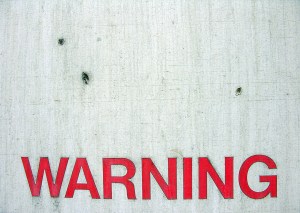If you own a business, you likely know the extensive planning that is involved in…

Liability Protection – You Have Been Warned
We have recently seen plenty of funny signs emerging during the COVID pandemic about mask wearing. Even before that, some businesses exercised a certain sense of humor when warning customers about potential dangers in store. It begs the question though. Are those signs actually useful? A court ruling proves they just might be.
In the case of Smith v. The Purple Frog, Inc., 2019 IL App (3d) 180132 the plaintiff alleged that he was injured after backing into a mounted heater while outside a bar having a cigarette. Above the heater was a colorful warning sign that read, “Heater is hot. We are not responsible for your silly ass getting too close!! Thanks, Pottsies.” Despite the plaintiff seeing this sign multiple times during his patronage of the bar, the complaint alleged the bar’s warning sign was inadequate as the heater was not properly installed according to the manual. The plaintiff also indicated he was intoxicated that evening. A summary judgement was granted to the defendant and the plaintiff appealed.
While it did not appear that the individual who installed the heater had any awareness of the manual, the court still felt that the warning sign was enough to cover the bar’s duty to warn. Citing Ward v. K Mart Corp., 136 Ill. 2d 132 (1990), the Appellate Court asserted principles stating the landowner does not need to provide an environment free of danger but warn of dangers on the premises. The court viewed the heater and warning sign as an open and obvious condition.
Plaintiff argued deliberate encounter and distraction, two exceptions to the open and obvious rule, applied. The court denied both arguments however as no compelling reason existed for the plaintiff to be forced to encounter the heater and the plaintiff’s distraction by intoxication was self-made. Additionally, there was no evidence to indicate the bar’s employees were aware of the level of intoxication at the time of the incident.
This case is an excellent example to show how clear warning signs can protect land and business owners from potential liability even if the sign appears to be unconventional and perhaps bit humorous.



